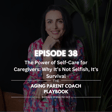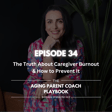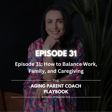Introduction to Boundary-Setting for Caregivers
00:00:02
Speaker
Hi everyone and welcome back to the Aging Parent Playbook. I'm your host, Dr. Barbara Sparacino, psychiatrist, aging parent coach, and fellow member of the Sandwich Generation. Today, i want to talk to you about something that every caregiver struggles with, but very few feel confident about.
00:00:20
Speaker
Setting boundaries. Specifically, how to set boundaries without feeling guilty, selfish, or like you're somehow abandoning your parent.
00:00:31
Speaker
because here's what I know after years of doing this work. Most caregivers are not short on compassion. They're short on capacity and they're drowning in guilt because of it.
00:00:42
Speaker
So if you've ever thought I'm doing everything I can, but it still doesn't feel like enough.
The Challenge of Saying No
00:00:49
Speaker
I can't say no, they need me. If I don't do it, who will?
00:00:54
Speaker
Then this episode is for you. Today we'll cover Why caregivers struggle with boundaries in the first place. How to set them clearly and kindly.
00:01:08
Speaker
And what to do when guilt or family pushback shows up. Because you deserve to care without losing yourself in the process. Let's get into it.
Generosity and Boundary Issues
00:01:25
Speaker
Why caregivers struggle with boundaries. So let's start with the real talk. Caregivers are some of the most generous people I know, but that generosity often comes at a cost, especially when boundaries are missing.
00:01:39
Speaker
And that's not because you're doing something wrong. It's because most of us were never taught how to set boundaries, especially with the people who raised us. So why is it so hard to say no as a caregiver?
00:01:53
Speaker
Reason number one, guilt. You love your parent, maybe they sacrifice for you. Maybe they're vulnerable now in ways that make you want to give even more. But love does not mean over-functioning.
00:02:07
Speaker
Love does not mean self-sacrifice without limit.
Cultural Expectations and Guilt
00:02:12
Speaker
Reason two, may be cultural or family expectations. In many families, caregiving isn't just expected, it's required, especially for women. Maybe you've heard, it's your duty.
00:02:25
Speaker
You owe them. We take care of our own. That's powerful conditioning, but unspoken rules don't have to become your life sentence. Reason number three, the myth that you have to do it all.
00:02:40
Speaker
Here's what I need you to hear. You are not the only solution. When we think, if I don't do it, who will? We trap ourselves in a cycle of burnout. There are other options and boundaries can help reveal them.
00:02:54
Speaker
Because here's the truth. Without boundaries, you will burn out. Not maybe, not someday, you will.
Defining and Communicating Boundaries
00:03:09
Speaker
So let's talk about how to set boundaries that protect your energy and your relationship with your parent.
00:03:17
Speaker
Boundaries aren't walls, they're clarity. They tell others where your responsibility ends and theirs begin. So let's break this down into three steps. Step one, get clear on your limits.
00:03:30
Speaker
Before you can set a boundary, you have to know your capacity. Ask yourself, what am I truly able and willing to do? What drains me the fastest?
00:03:41
Speaker
What support do I need in order to keep showing up? For example, maybe you can take your parents to appointments. but you can't be available every single evening.
00:03:54
Speaker
That's your limit. That's okay. Step two, use clear, direct, compassionate language. When it comes time to say no or no, not right now, use language that's kind but firm.
00:04:08
Speaker
Here are some examples. I can help with dinner prep on Sundays, but I cannot commit to every day. I wish I could stay longer, but I need to get home to rest.
00:04:21
Speaker
I love you and I need to take care of myself too. You don't owe anyone a dissertation on your boundary. Kind and clear equals enough.
Managing Guilt for Self-Care
00:04:34
Speaker
So step three, let go of guilt. Now here the hardest part, detaching from guilt. But let me reframe it for you.
00:04:45
Speaker
Taking care of yourself is also caregiving because if you burn out, then who shows up for your parent? If you're ever exhausted, resentful, or physically unwell, how are you supposed to be present and effective?
00:04:58
Speaker
You deserve rest, you deserve peace, and you deserve to protect your own mental health even while caring for someone else's needs.
00:05:14
Speaker
So now let's address handling pushback and guilt. Now, what happens when people Don't like your boundary because yes, it's going to happen. Here's how to handle it with confidence and grace.
00:05:26
Speaker
One, repeat your boundary without justifying. You don't have to explain your every decision. If someone pushes back, calmly repeat yourself. For example, I understand that's frustrating.
00:05:36
Speaker
I still can't do that. I hear you. I still won't be available on Saturdays. Stay calm, stay consistent. Two, offer an alternative if you want to.
00:05:48
Speaker
This isn't always required, but it can help. Try, I can't pick her up from the doctor, but maybe we could hire a driver. I'm not able to manage the meds, but we could ask the pharmacy about packaging.
00:06:01
Speaker
Alternatives show that your no isn't abandonment, it's boundary with intention.
Sustaining Well-being through Boundaries
00:06:06
Speaker
And number three, remind yourself you're allowed to have needs. Boundaries are not a betrayal.
00:06:13
Speaker
They're how we protect our sanity, our energy, and our relationships. Repeat this out loud if you need to. I am not a bad person for taking care of myself. In fact, this is what long-term sustainable caregiving looks like.
00:06:34
Speaker
Let me leave you with this. Caregiving without boundaries doesn't make you more loving. It makes you more likely to burn out, lash out, or check out completely.
00:06:45
Speaker
But boundaries They let you show up fully, consistently, and without resentment. They make room for you to exist in the story, not just as a caregiver, but as a whole person.
Resources and Encouragement
00:06:57
Speaker
If you need help setting better limits or navigating guilt when you do, check out my ref free resources at theagingparentcoach.com.
00:07:10
Speaker
And if this episode resonated with you, send it to a friend or a sibling who's carrying the weight of caregiving too.
00:07:18
Speaker
They may need to hear this more than you know. Thanks for being here and I'll see you next time on the Aging Parent Playbook. Take care.




















